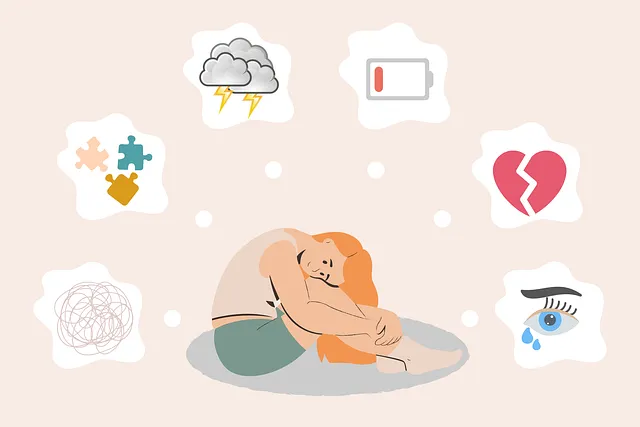The Lone Tree Kaiser Permanente mental health center, owned and operated with a focus on continuous improvement, prioritizes program evaluation for enhanced mental wellness outcomes. They employ comprehensive assessments, including pre-post comparisons and standardized tools, to track client improvements in symptoms, functioning, and well-being. Additionally, they emphasize continuous process evaluation through monitoring engagement, protocol adherence, service quality, client satisfaction, therapist supervision, and evidence-based practices. This multifaceted approach ensures effective, tailored interventions, cultural sensitivity, and a supportive healing environment. Stakeholder involvement from patients, families, providers, and community leaders further bolsters the center's holistic commitment to mental wellness.
At Lone Tree Kaiser Permanente, the mental wellness program’s success hinges on rigorous evaluation. This comprehensive guide explores the vital role of program evaluation in enhancing client outcomes at our leading mental health center. We delve into key components, effective methodologies, stakeholder involvement, and continuous improvement strategies. Discover how Lone Tree Kaiser Permanente by owner leverages data to optimize services, ensuring a holistic approach to patient care and well-being.
- Understanding the Importance of Program Evaluation for Mental Health Centers
- Key Components of an Effective Evaluation Framework
- Methodologies for Assessing Client Outcomes at Lone Tree Kaiser Permanente
- Stakeholder Involvement and Feedback Incorporation
- Continuous Improvement: Using Evaluation Data to Enhance Services
Understanding the Importance of Program Evaluation for Mental Health Centers

At Lone Tree Kaiser Permanente mental health center by owner, we recognize that evaluating the effectiveness of our programs is crucial for improving mental wellness outcomes. Program evaluation serves as a compass, guiding us to understand what works, what doesn’t, and where adjustments are needed. By systematically assessing the impact of our initiatives, whether focused on Mindfulness Meditation, Mental Health Policy Analysis and Advocacy, or Anxiety Relief, we can tailor our services to better serve our community.
This process involves collecting and analyzing data, gathering feedback from clients, and measuring key performance indicators. Such insights empower us to make informed decisions, strengthen service delivery, and ensure that resources are allocated efficiently. Ultimately, effective program evaluation enables Lone Tree Kaiser Permanente mental health center by owner to foster a more supportive and healing environment for all individuals seeking mental wellness support.
Key Components of an Effective Evaluation Framework

An effective evaluation framework for mental wellness programs, such as those offered at Lone Tree Kaiser Permanente mental health center by owner, should encompass several key components. Firstly, it must include robust measures to assess client outcomes, capturing improvements in symptoms, functioning, and overall well-being. This involves pre-post assessments and follow-up evaluations using standardized tools tailored to the specific program’s goals.
Secondly, an impactful evaluation system promotes ongoing process assessment by tracking engagement, adherence to protocols, and service delivery quality. This includes examining client satisfaction, therapist supervision, and evidence-based practices employed. By integrating these elements, the program can ensure its interventions are not only effective but also sustainable, fostering mental health awareness and building resilience among participants while implementing robust risk management planning for mental health professionals.
Methodologies for Assessing Client Outcomes at Lone Tree Kaiser Permanente

At Lone Tree Kaiser Permanente, evaluating client outcomes is a multifaceted process designed to ensure the effectiveness and impact of their mental wellness programs. The mental health center by owner employs a range of methodologies to assess the progress and well-being of individuals participating in various therapy sessions and support groups. One key approach involves utilizing standardized assessment tools tailored to specific mental health conditions, allowing for quantitative comparisons and tracking improvements over time. These tools include validated questionnaires and interviews that gauge symptoms, functional status, and overall quality of life.
Additionally, Lone Tree Kaiser Permanente integrates qualitative feedback through client surveys and one-on-one interviews. This method captures personal narratives, experiences with the program, and areas where support could be enhanced. By combining quantitative data with subjective reports, the mental health center by owner gains a comprehensive view of client outcomes, enabling them to refine program design and Mental Health Education Programs accordingly. Moreover, their efforts in mental illness stigma reduction are evident through regular workshops and awareness campaigns, alongside stress reduction methods incorporated into daily practice, showcasing a holistic commitment to client well-being.
Stakeholder Involvement and Feedback Incorporation

Effective mental wellness program evaluation requires stakeholder involvement and feedback incorporation at every stage. At the Lone Tree Kaiser Permanente mental health center by owner, this collaborative approach ensures that programs meet the unique needs of the community they serve. By engaging diverse stakeholders such as patients, families, healthcare providers, and community leaders, the center captures a holistic view of mental wellness practices and their impact.
Incorporating feedback from these stakeholders allows for tailored interventions focusing on key areas like stress management, self-awareness exercises, and mind over matter principles. This iterative process not only enhances program quality but also fosters trust and engagement among participants. By listening to and implementing this feedback, the center can continuously improve its offerings, ultimately leading to better outcomes and a more supportive mental wellness environment.
Continuous Improvement: Using Evaluation Data to Enhance Services

At the Lone Tree Kaiser Permanente mental health center by owner, continuous improvement is a cornerstone of their service delivery model. Evaluation data plays a pivotal role in enhancing and refining mental wellness programs. By regularly assessing client outcomes, satisfaction levels, and treatment effectiveness, the center can identify areas that need adjustment. This data-driven approach allows them to implement evidence-based strategies tailored to the unique needs of their diverse clientele. For instance, incorporating Mindfulness Meditation techniques into therapy sessions has shown promising results in improving clients’ stress management and overall well-being.
The center’s commitment to Cultural Sensitivity in Mental Healthcare Practice is also evident in their evaluation process. They recognize that cultural backgrounds significantly influence mental health experiences and treatment preferences. Therefore, they analyze how different cultural factors impact client engagement and outcomes, ensuring their services remain inclusive and accessible. This continuous improvement cycle fosters a dynamic environment where the Lone Tree Kaiser Permanente mental health center by owner can adapt and grow, ultimately boosting client confidence and satisfaction.
The evaluation of mental wellness programs, such as those at Lone Tree Kaiser Permanente mental health center by owner, is a cornerstone for ensuring their effectiveness and adaptability. By employing comprehensive methodologies that include stakeholder feedback and continuous data analysis, centers like this can optimize services tailored to client needs. Incorporating these best practices not only enhances the quality of care but also fosters a dynamic and responsive environment where positive mental health outcomes thrive.




